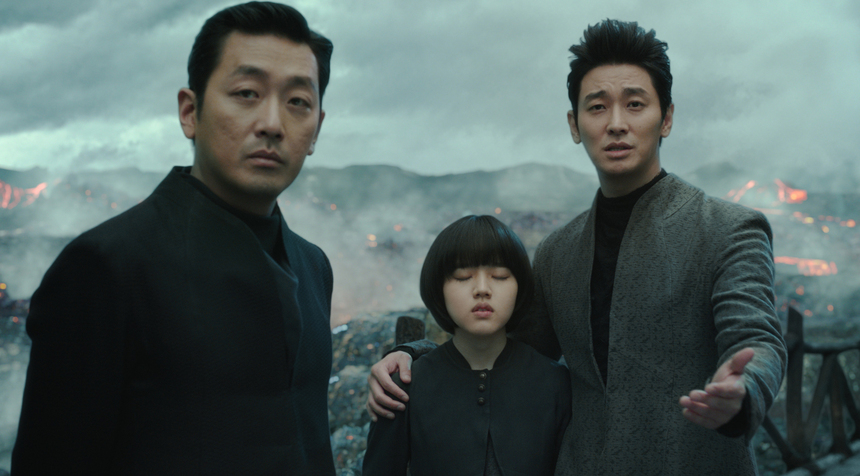Review: ALONG WITH THE GODS: THE TWO WORLDS, Ambitious Fantasy Epic Indulges in Cheesy Backdrops and Melodrama
Kim Yong-hwa directs a razzle-dazzle tale of the afterlife.

Riding in on a wave of curiosity and anticipation, popular webcomic adaptation Along with the Gods: The Two Worlds, the opener of Korea's first simultaneously filmed two-part series, represents one of the biggest gambles in Korean film history. No Korean film has ever relied on so much VFX work and at a cost of roughly $36 million, failure would spell certain doom for the people behind it.
The filmmakers have hedged their bets with an effects-heavy saga that is likely to appeal to teens while a bombastically melodramatic climax may seal the deal for older crowds in Korea as well. Though they need not worry about filing for bankruptcy just yet, the result is also an awkwardly plotted and tedious affair that is far more adept at ticking boxes than at telling an absorbing story.
Firefighter Ja-hong dies on the job and meets three guardians who are tasked with bringing him to the afterlife. In order to gain the right to be reincarnated, he must face seven trials over the course of 49 days, during which his life's conduct will be judged. Fail any of the tests and he will be condemned to eternity in the hell tailored to whichever sin he broke. Head guardian Gang-rim takes a special interest in the kind-hearted Ja-hong and goes back to earth to check in on the mother and brother he left behind.
Following Korea's first 3D film Mr. Go in 2013, Kim Yong-hwa (200 Pounds Beauty, Take Off) returns to the director's chair with the help of Dexter Studios, the effects company he founded while he made his previous work. Mr. Go wound up being a failure, but Dexter has become one of the most successful VFX outfits in Asia, having won several awards for their work on Chinese blockbusters such as Tsui Hark's The Taking of Tiger Mountain and Cheang Pou-soi's The Monkey King 2.
Prior to a company like Dexter existing, a project like Along with the Gods wouldn't have been feasible in Korea and while the company is able to handle an array of technical demands, the dominant visual takeaways of the film are its digital vistas of the afterlife, as the main four characters trudge through vastly different landscapes that teem with strange creatures. Yet while the backdrops are well rendered, the heavy emphasis on green screen work gives many scenes a stilted feel, which is exacerbated by the over-the-top performances.
My Sassy Girl star Cha Tae-hyun doesn't get to exercise his funny bone too much as the man facing trial in the afterlife but seems fairly comfortable in a part that falls within his comfort zone, while Ha Jung-woo (The Handmaiden) cools down his natural charisma as Gang-rim in a role that is at times a little rigid. Aimed squarely at teenagers, Ju Ji-hoon (Confession) and Kim Hyang-gi (Snowy Road) offer highly affected and frequently grating performances as the guardian sidekicks, somewhere between a theatrical period drama and a high school PSA video.
Though his name hasn't come up much in marketing, Kim Dong-wook plays Ja-hong's brother on earth in a meaty role which grows as the film eventually hits its melodramatic endgame. Playing his friend in the military, Kpop star Doh Kyung-soo (Room No. 7) continues to be unconvincing as he whimpers through his performance, Lee Jung-jae (Assassination) plays the stern, godlike leader of the afterlife with his deep, booming voice, while Oh Dal-su (Veteran) and Im Won-hee (Crying Fist) offer comic support as the buffoonish prosecutors of the afterlife. Beyond them, The Two Worlds is littered with well-known actors (some in blink and you'll miss 'em cameos), which include Ma Dong-seok (Train to Busan), Kim Hae-sook (The Thieves), Kim Ha-neul (Blind), Lee Kyoung-young (Inside Men) and Yu Jun-sang (The Day He Arrives).
Focusing so much on razzle-dazzle and tossing crumbs to what demographics they think they need, The Two Worlds does a very poor job at world-building as it fails to give a sense of what this afterlife is and who its inhabitants are. More troubling is the lack of narrative focus as the film trundles through repetitive trials while tangental threads take place on earth. The side plots eventually combine with the main story to drag the film through a protracted and exceedingly histrionic finale which puts a surprisingly neat bow on this opening installment, to the point that it is unclear what might happen in part two (which will be called The Last 49 Days).
Coming as such a self-contained story it's a little unclear why the filmmakers felt this needed to be greenlit as a two-part series (perhaps it was a cost-cutting exercise) but if there's anything to look forward to next summer it will be the participation of Ma Dong-seok. He's only teased in The Two Worlds but it looks like he'll have a major role next time around. Perhaps he'll be able to inject some more fun into what is so far little more than an expensive soundstage get-together.







